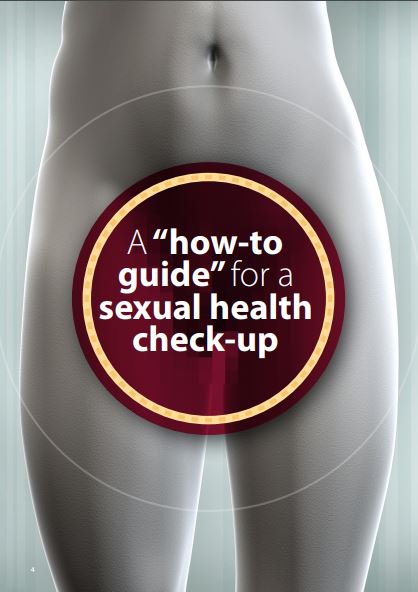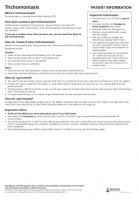Trichomoniasis is caused by a parasite called Trichomonas vaginalis. Trichomoniasis is transmitted through contact with genital fluids from the penis or vagina of someone who has the infection. Ιt can also be passed on by sharing sex toys, eg, vibrators. You don’t need to have many sexual partners to get the infection.
Low or no data? Visit zero.govt.nz, scroll down the page then click on our logo to return to our site and browse for free.
Trichomoniasis
Key points about trichomoniasis
- Trichomoniasis is a sexually transmitted infection (STI) caused by the parasite Trichomonas vaginalis.
- It's common and easy to treat with antibiotics, some people don’t notice any symptoms.
- Trichomoniasis is diagnosed with a urine swab (women) or urine sample (men).
- If you have trichomoniasis, you need to tell anyone you have had sex with in the past 3 months to get tested and treated.
- So you don't pass it on, avoid sex for 7 days after you and your partner(s) have been treated, or use condoms if this isn't possible.

About 70% of infected people don’t have any signs or symptoms. When trichomoniasis does cause symptoms, they can range from mild irritation to severe inflammation. Some people get symptoms within 5–28 days of being infected, but others don’t develop symptoms until much later. Symptoms can come and go.
Women
- You may feel pain, burning or itching in your genital area.
- You may also feel pain or discomfort when passing urine (peeing) or having sex.
- You may notice a discharge or fluid leaking from your vagina.
- You may also have a bad odour (smell) in your genital area.
- Many women have no symptoms.
Men
- Μost men don’t have symptoms.
- You can still pass trichomoniasis on even when you don’t have symptoms.
- You may have discharge or fluid leaking from your penis.
- You may also have pain when passing urine (peeing) or during ejaculation (coming).
- You may have pain, swelling or redness around the head of your penis.
As the symptoms of trichomoniasis are similar to other STIs, it can be difficult to diagnose. Your doctor will ask you a few questions about your symptoms, and whether you have had any sexual contact with someone with trichomoniasis infection. Your doctor will also examine your genital area.
For women, a swab will be taken from your vagina. For men, your doctor may suggest a urine test or a swab depending on your symptoms. Your doctor may offer treatment straight away without waiting for test results if you have had sex with someone who has trichomoniasis.
If you have trichomoniasis, your doctor may also test for other STIs or do a sexual health check.
Trichomoniasis can be treated with either a single dose of antibiotics or as a 1-week course. The antibiotic is called metronidazole. The tablets can sometimes make you feel a bit sick, but it helps if you take them with food. Don’t drink alcohol for 24 hours after taking the tablets as it will make you feel really sick.
Without treatment, the infection can last for months or even years.
It is common to get infected with trichomonas again. Make sure all your sexual partners get treated too. Don’t have any unprotected sex (sex without a condom) until a week after you have started antibiotic treatment. Make sure you get checked again if your symptoms come back.
Apps reviewed by Healthify
You may find it useful to look at some Women's health apps.
Usually, there are no complications from a trichomonas infection unless it is left untreated.
- It can increase the risk of getting or spreading other STIs, such as HIV and bacterial vaginosis. For example, trichomoniasis can cause genital inflammation, which makes it easier to get infected with the HIV virus, or to pass the HIV virus on to a sex partner.
- Both men and women are at increased risk of infertility.
- Trichomoniasis can cause pelvic inflammatory disease in women.
- It can also cause inflammation of the prostate gland in men (prostatitis).
- Trichomoniasis has been associated with having your baby too early (preterm), and for your baby to have a low birth weight.
Practising safer sex can protect you from getting, or passing on trichomoniasis and other STIs. The following tips can help prevent STIs:
- Use condoms during vaginal, oral or anal sex with every partner, every time.
- Keep sex toys clean and avoid sharing sex toys with others.
- Have sex with only one partner (who is also only having sex with you).
- Avoid having sex if you or your partner has any symptoms such as sores, ulcers, discharge or any pain around the genital area – get checked by a doctor first.
- Have regular STI checks (every 3 months), especially if you have had any unprotected sex (sex without a condom) or have more than one partner.
- Wash your hands with soap and water before and after sex or sexual play.
Read more about safer sex.
If you think you have trichomoniasis or any other sexual health concerns, you can see or talk to your GP. Alternatively, there are other options where you can get help.
Sexual health clinics(external link)
Sexual Wellbeing Aotearoa clinics(external link)
Trichomoniasis patient information(external link) NZ Sexual Health Society
Trichomoniasis(external link) Sexual Wellbeing Aotearoa, NZ
Trichomoniasis (Trich)(external link) Just The Facts, NZ
Trichomoniasis(external link) NHS, UK
Apps
Resources
A compact guide to sexual health(external link) HealthEd, NZ, 2010
A "how-to guide" for a sexual health check-up(external link) BPAC, NZ, 2013
Trichomoniasis(external link) NZ Sexual Health Society, 2012
References
- Trichomoniasis management summary(external link) NZ Sexual Health Society, 2017
- Trichomoniasis patient information(external link) NZ Sexual Health Society
- Trichomoniasis(external link) Sexual Wellbeing Aotearoa, NZ
- Trichomoniasis (Trich)(external link) Just The Facts, NZ
- Trichomoniasis infection(external link) HealthInfo Canterbury, NZ
- Trichomoniasis(external link) Patient Info, UK
- Trichomoniasis(external link) Centres for Disease Control, US
- Trichomoniasis management summary(external link) NZ Sexual Health Society, 2017/li>
- Sexually transmitted infections summary of guidelines(external link) Sexually Transmitted Infections Education Foundation, NZ, 2017
- Partner notification/contact tracing guideline(external link) NZ Sexual Health Society, 2021
- A “how-to guide” for a sexual health check-up(external link) BPAC, NZ, 2013
- Treatment of sexually transmitted and other genital infections(external link) BPAC, NZ, 2009
Apps
Brochures

HealthEd, NZ, 2010

BPAC, NZ, 2013

NZ Sexual Health Society, 2012
Credits: Healthify editorial team. Healthify is brought to you by Health Navigator Charitable Trust.
Reviewed by: Dr Phoebe Hunt, sexual health registrar, Auckland DHB
Last reviewed:
Page last updated:





